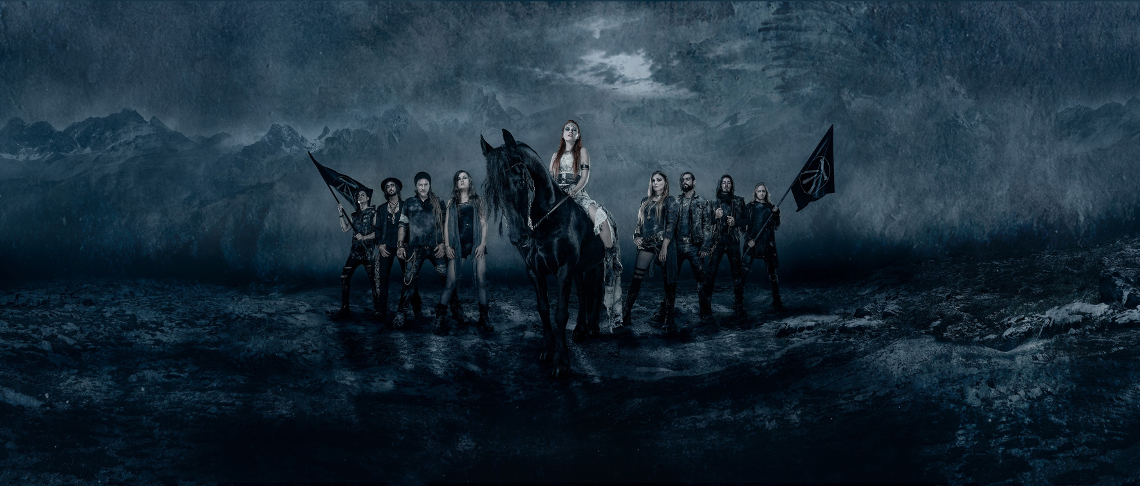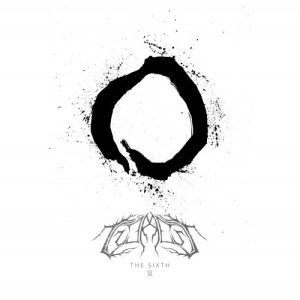As I’m writing this, the new Scorpions record has dropped today and sounds like something plucked from the early 80s, and in the news Russia is being a belligerent antagonist on the world stage yet again. If I wasn’t lucid, I could be deceived that we were traveling backwards in time for better or worse. Dark times aside, that Scorpions record is certainly something I’m going to be diving into on the blog very soon, but before I do, I ought to clear the decks of everything I’ve been listening to metal-wise for the past month and a half. I took some time in January to investigate records I’d missed in 2021, but have spent the rest of the time since digging into the flurry of new music these first two months have yielded. Part one of this coverage was done on the recent episode of MSRcast, and I’ll be talking with Cary on our next episode about our having just seen Bruce Dickinson’s An Evening With spoken word show here in our backyard of Stafford, Texas the other night. Covered below is everything else I didn’t really get to on the podcast, but be sure to let me know in the comments section if there’s something I’ve egregiously overlooked new music wise.
Amorphis – Halo:

There are many people who loved the last Amorphis album Queen of Time, I was not one of them. I didn’t exactly hate it, because it had some spectacular moments (the Anneke van Giersbergen duet “Amongst Stars” for one), but it was a let down for me after Under The Red Cloud and before that, Circle and The Beginning of Times. The thing that was frustrating about it was that it was hard to pin down what exactly felt off to me about it. I wondered if it wasn’t that there was an imbalance in the band’s melodic and aggressive sides, something leaning too much in one direction or another, but that didn’t make sense because Red Cloud was indeed their most melodic leaning album to date and I thought that was a masterpiece. Pushing past uncertainty, I’d say I’ve found more to enjoy here, but only slightly more — it doesn’t have a singular cut as spectacular as Queen of Time’s aforementioned glorious duet, but Halo’s heavier moments ring more convincing to me. Album opener “Northwards” has a crushing, intense attack built on a hypnotically rhythmic riff sequence, with Tomi Joutsen’s guttural narration pushing the way forward. The little bit of 70s Hammond organ shimmying in the middle like some long lost Deep Purple cut works really well as a dynamic shift in tone, especially with keeping it fairly uncomplicated and simple and not spiraling off into frenzied weirdness like so much recent Opeth. The multi-faceted “The Wolf” is a satisfying blast of brutality juxtaposed with some cosmic spaciness that doesn’t wear out its welcome. Slightly mellower but very much vintage Amorphis, the title track is an achingly beautiful Esa Holopainen lead melody draping across a frenetic assault underneath, Joutsen taking a more serenely mournful approach on vocals rather than one of angst and fury. I also thought “On the Dark Waters” had a compulsive quality to its rhythmic strut and a really sweetly dark chorus melody that worked with Joutsen’s vocal tone in that really inimitable way that only Amorphis could pull off (also dig the sitar-ish melodies in that mid-song bridge sequence).
And while “The Moon” isn’t as compelling as some of their previous singles, it’s still got that mid-tempo Amorpi-groove on lock and there’s a dramatic build up to a chorus that is good in the moment, if not ultimately memorable. But that song hints at the more concerning deficiencies that are noticeable on songs like “When the Gods Came” and “Seven Roads Come Together”, where there are good elements in place in the buildup to what should be a fantastic refrain, only for everything to either fail to launch or unravel entirely. Take the former, this album’s “Wrong Direction” in that it’s chorus vocal melody comes off as so misdirected that it brings the whole song down with it. The offending line is Joutsen singing “…they taught us how to live our lives”… a line that just hangs there without any musical support, not to mention as a melodic idea it feels incomplete or just incorrect as is. Regarding “Seven Roads…”, it’s one of those moments where I really love everything about the song except that refrain, and I’m sorry, but when you’re escalating tempos alongside some tension building orchestration, I need that refrain to pay off hard. This might be the most aggravating moment on an album that has it’s fair share of frustrating ones, because this song could’ve been the highlight on Halo but it falls short in it’s most critical moment. And then there’s other tunes that are you know, just there, such as “A New Land”, “Windmane”, and “War” which I honestly can’t remember after I’m done listening to them. Sometimes I get the feeling that Amorphis has found itself in a bit of a cycle where they’re trying too hard to sound like modern day Amorphis, shoehorning in clean vocal choruses or verses where maybe a song would be better served by just leaning harder full tilt in a more aggressive direction. In summation, at least it’s a step above Queen of Time, but not much of one, and that’s slightly concerning and I’m left a little underwhelmed still.
Battle Beast – Circus of Doom:

Battle Beast’s sixth album, Circus of Doom, is an interesting case study in a band mid-career stumble onto something genuinely inspired. I say it’s interesting because its really not that different from their past two albums on a stylistic level, but there is an almost imperceptible shift happening with these songs. Their last album was met with some scathing criticism for the band’s perceived stepping over the line between hooky pop-metal and just egregious, commercial pop. Now I actually enjoyed some of that record, but I do recognize where some of those criticisms might be coming from, and seemingly so does the band. As if realizing they hit the limits of where they could go with that aspect of their sound, they’ve retreated just a bit here, but not to the Priest-ian roots of their early albums. Instead on songs here such as “Eye of the Storm”, “Wings of Light”, “Master of Illusion”, and “Armageddon”, the band shifts their pop direction away from the Roxette-ian Swedish-tinged merger with 80s American hard rock of No More Hollywood Endings and leans hard into late era Abba (think the dark melodrama of the Swedes Super Trouper and The Visitors eras… full on Swedish then). It’s an incredibly shrewd move, and that ABBA influence allows the band to stay affixed to a poppy songwriting approach while painting in darker colors that accentuate Noora Louhimo’s incredibly emotive, raspy vocals. You really hear how this combination is maximized on “Where Angels Fear to Fly”, where we get an almost regal, Savatage-ian chorus that at first seems to stand apart from the tempered hard rock strut of the verses, but which Louhimo is able to merge together towards the end of the song with her vocals alone. It sounds like the band has realized that the best way to go about finding their sound is to simply elevate her ability to sound damn fantastic. Her voice is tailor made for this hard rockin/late era ABBA crossroads, and they’d do well to stay in this pocket for future albums. Honestly, the band has never sounded better.
Planeswalker: Sozos Michael & Jason Ashcraft – Tales of Magic:

In the depths of power metal fan communities, this was a much anticipated album despite its lower profile, independent release. Jason Ashcraft is of course the guitarist and founder of Helion Prime, one of the more well known leading lights of North American power metal in the past few years and Sozos Michael is an excellent melodic vocalist from Greece who you might recognize because he sang on Helion’s second album after Heather Michele Smith’s departure in 2016. You might remember that I didn’t think 2021 was all that stellar of a power metal year (a largely pervasive sentiment it seems), but it looks like this year is getting an early start on rectifying that deficiency with this and other recent debuts (Power Paladin, and even a full length Fellowship album due sometime soon). Simply put, Planeswalker’s Tales of Magic is maybe the most satisfying classic Euro-power metal release in the past twelve months and perhaps longer. Clocking in at a tidy six tracks and forty-two minutes of original music (minus a punchy cover of Kiss’ “A Million To One” at the end as a bonus), Ashcraft and Sozos have crafted a superb record of anthemic, triumphant Euro-power with some North American trad-metal influences heard in the riff sequences here and there (see the surprisingly death metal tinged riffage at the 1:40 mark of “Oath of the Gatewatch”). Ashcraft is a talented songwriter in terms of putting together a framework of melodic yet aggressive riffing and some really dizzying, glorious solos, but it’s been proven that he shines brightest when paired with a vocalist who understands how to develop their own vocal melodies. That’s not a knock on Ashcraft by the way, it’s certainly the way things worked with Thomas Youngblood and Roy Khan and with Ashcraft’s own prior experiences with Heather Michele Smith. This sounds like a true collaboration, with Sozos and Ashcraft sometimes joining together on a shared melody (“Tales of Magic”, “The Spark”), or at times Sozos doing the piloting alone as on the theatrical stage play of “Shadow of Emeria”. The two killer cuts here are the back to back daggers of “Blackblade” and “The Forever Serpent”, two songs that had me glory clawing in the car down the freeway. Ashcraft’s layered lead melody in “Blackblade” is inspiring in a euphoric, head rush kind of way, particularly when he lets it ring and repeat to close out the song. And “The Forever Serpent” is just a beast of a song, one of those instant power metal classics that exemplify the potential of power metal to inspire and make you feel genuinely happy for a few minutes. Consider this the year’s first (and hopefully not last) must listen, can’t skip power metal classic.
Nocturna – Daughters of the Night:

If you listened to the last MSRcast, you’ll hear the moment when I realize during the recording that Nocturna is yet another project of Italian power metal wunderkind Federico Mondelli (Frozen Crown, Volturian, etc). I don’t know the motivation for this new project, but it’s not too far off from what he’s doing with his wife Giada Etro in Frozen Crown, albeit with a more symphonic, darker themed approach with two lead vocalists in Rehn Stillnight and Grace Darkling. These two women both have relatively similar melodic singing tones, an unusual approach for any band to take, They both seem to veer between a classically informed approach ala Dianne Van Giersbergen and relatively straightforward melodic vocals, but together in tandem it creates an approach that is actually somewhat refreshing in comparison to the standard beauty and the beast vocal duo tropes found in the genre. Some of these songs are pretty darn good in their own right, with Mondelli seemingly having saved his best riffs for this project (the last Frozen Crown record left a lot to be desired). The clear example of this is “Daughters Of The Night”, which sees some furious riffing bookending a truly gorgeous layered vocal duet during the refrain. Similarly on “Blood of Heaven” Mondelli serves up a thrashy bed of power metal guitars that is a fantastic push against Stillnight and Darkling’s combined melodic vocals, which aren’t sugary, but certainly are lush and full. As a songwriter, Mondelli feels far more in his element here than in Frozen Crown where it seems like he’s still trying to figure out how all the pieces are supposed to fit together. And maybe it’s the singular focus on vocal melodies that does the trick, as on “Darkest Days”, which sounds worryingly glittering and fragile until the chorus sees both singers pulling the song together with an incredibly tight, nimbly delivered vocal melody. There’s something fresh and (using the F-word here) fun, about this album. It’s dual vocal approach is unique within the genre, even in comparison to other clean vocal groups like Temperance. Hoping we get another record and that this isn’t just a one-off.
Dawn of Solace – Flames Of Perdition:

The irony of this album being covered in the same article as the Amorphis review is that Flames of Perdition is solely responsible for why I’m late in publishing this damn thing. I spent so much time listening to this record that repeat listens of the new Amorphis kept getting pushed to the backburner, because when it comes to dark, slightly depressive melodic metal this was where I was turning to these past few weeks. Dawn of Solace if you didn’t already know is yet another project of Wolfheart guitarist/vocalist Tuomas Saukkonen, pairing himself here with a gifted Finnish singer named Mikko Heikkilä (who sang in Saukkonen’s now defunct Black Sun Aeon) who sounds like a less nasally Tuomas Tuominen (of The Man-Eating Tree, another um, Finnish band). Contrary to his more brutal side shown in Wolfheart, Dawn Of Solace really sees Saukkonen exploring more groove based, clean vocal territory, stepping away from the mic for the most part (he provides some growls) to let Heikkilä steer these songs with some really incredible vocal performances. There’s a desperation to his vocal approach that feels understated and worn in, and it matches the relatively straightforward riff based mid-tempo rhythm work that Saukkonen builds these songs around. His songwriting often mixes in crisp acoustic guitars as melodic guiderails with Sentenced-esque melodic doom laden riffs piled underneath like wood for a bonfire. The album opener “White Noise” illustrates this combination’s simple but elegant effectiveness, allowing Heikkilä the space to take the reins with vocal melodies that are expressive and tell a story. My favorite moment on the record might be the title track itself, a piano dirge intro that softly shakes out into a darkly comforting acoustic ballad. Saukkonen lets this gorgeousness unfold while utilizing silence in scattered pulses, only to hit you with a sudden burst of cinematic noise around the two minute mark in a dramatic flourish. The push and pull tension in this song and in others such as “Black Shores” is at times unsettling and disquieting, but always compelling to experience. I think this album has a meditative quality to it that gives it an emotional resonance that I’ve been longing for in a metal record for awhile now. Get this in your headphones before the cold weather drifts away.
Magnum – The Monster Roars:

This one almost snuck by me, arriving with little advance fanfare or media buzz which isn’t exactly surprising given Magnum’s veteran status and their almost non-existence on this side of the Atlantic as a known quantity. It’s a bummer because classic rock fans would really love what the band has been doing lately, their last two albums being in particular fantastic examples of a late career artistic renaissance (The Serpent Rings was a 2020 album of the year listee). That record in particular was everything I could have wanted out of a Magnum record, an Avantasia influenced, power metal invoking classic that was built on sweeping melodies, some incredibly passionate performances from vocalist Bob Catley and a sense of grandeur that reminded me of On A Storytellers Night on steroids. I suppose it was inevitable then that The Monster Roars would be a bit of a letdown as a follow-up, although there are certainly moments here that remind me of what they were capable of on the last two records. I think the problem with The Monster Roars as it pertains to what I want are that the band has slightly shifted their approach to a more rootsy hard rockin’ feel rather than the dramatic and epic bombast heard on those records. Lead single “I Won’t Let You Down” is a vivid example of this, a song that is caught between a escalating keyboard arrangement that seems to want to take things to new heights, only to see the song retreat to a slower, somewhat meandering guitar pattern in a jarring shift. Other songs in this laid back mode just never seem to take off, like “Can’t Buy Yourself A Heaven”, where the chorus feels almost underdeveloped. Songs like “The Day After the Night Before” have some cool passages, only for their momentum to be halted with a sudden turn into a blander, less exciting area. Frustrating might be too harsh a criticism, but unsatisfying certainly describes my feelings on most of these songs. I’ll give credit to “Remember” though for being an absolute Magnum classic, the playful piano buildup, the tambourine adorned chorus with an awesome driving riff and Catley magic. I also enjoyed the Savatage vibe of “All You Believe In”, and the rare instance of an accompanying horn section in “No Steppin’ Stones” is a blast (seriously a cool throwback to something that is unmistakably out of fashion but I still kinda love). Other Magnum fans might really love this album, but the monster wasn’t roaring for me I guess.









